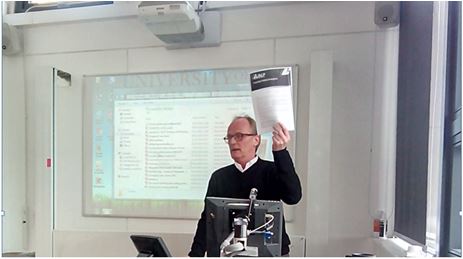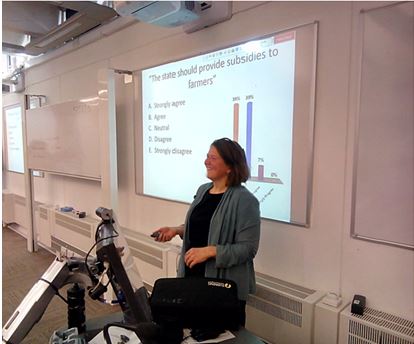Ellie Chowns is a Teaching Fellow in the International Development Department (IDD). Her background is in international development NGOs, including Christian Aid, Concern Universal, and Quaker Peace and Social Witness. She specialises in monitoring, evaluation, and learning, and has worked in Malawi, Uganda, Burundi and the Philippines. Ellie teaches Development Management and Making Policy (on-campus and distance learning).
Tom Hewitt is Director of Academic Programmes in the International Development Department. He is a specialist in development theory, governance and the politics of development, science and technology policy, and child rights and rights-based programming. Tom teaches Critical Approaches to Development (CAD), Development Politics (DP), and Development Management in our on-campus degree programmes, and on-line versions of CAD, DP and Research Methods.
Ellie Chowns and Tom Hewitt have been awarded the 2015 Teaching Academy Award in Educational Innovation Enhancement and Innovation in the category of Educational Innovation for their work in Masters-level teaching.
Reacting to their award, Ellie said: ‘‘I’m absolutely delighted because I think the award recognises the fact that we have thought hard about how to meet the needs of really diverse group of students, so it’s recognition for our effort and it’s an encouragement to us and others to think creatively about learning’’. Tom added, ‘‘I think it’s really good that the university does recognise new ways of teaching and learning and all the effort that goes into trying to give students a rewarding experience’’.
In his award message, Professor Jon Green, Director of the Teaching Academy and Deputy Pro-Vice-Chancellor (Education) said, ‘‘I am delighted to be able to congratulate all of this year’s winners of the Teaching Academy Awards …One of the major aims of the Teaching Academy is to recognise and reward inspiring and innovative teaching, and learning support provided by the staff, that enhances the student experience”.
Ellie and Tom have instigated several key innovations in their co-convened Masters-level Development Management module, which attracts a very diverse cohort of about 40 students per year. Around 90% are overseas students, from a very wide range of countries (mainly Asia and Africa). While some have many years’ experience of working in international development, a large minority have no background in the subject, nor work experience. They thus face a significant challenge in ensuring that the module stimulates and supports all students.
On the basis of experience and feedback from the previous year, a review of literature, and student focus group discussions, Ellie and Tom introduced a newly designed curriculum, changed assessment and feedback methods, and introduced more active learning.

The first assignment was redesigned to give more, and more rapid, diagnostic and formative feedback, to spot struggling students early in the module. For the first five weeks students produced a short written critical review of their readings each week. This was discussed in small groups in class. The mini essays then fed into the summative assignment. This ensured that students did the reading; gave them lots of writing practice; gave them rapid, criteria-focused feedback, both from peers (in class), and from tutors (in writing and on video via Canvas, as well as through a one-to-one tutorial in Week 4).
The second assignment, previously a standard essay, is now an individual write-up of a group project on the topic ‘a strategy to achieve one of the Sustainable Development Goals in a country of your choice’. This assessment rewards both high-quality group work and individual effort and achievement.
Also as a result of the previous year’s experience, a new department-wide effort has been catalysed to diagnose and address English-language support needs early on, including adoption of a diagnostic test, and expanded provision of (streamed) department-specific language lessons.
Informed by the concept of the ‘flipped classroom’, Ellie and Tom have changed the way they use teaching sessions. Half the class time is used for small group work, followed by plenary discussion of emergent themes. Lectures are still delivered in person, but are also provided from video recordings online.

Curriculum design changes have been aided by use of learning technologies. Ellie and Tom have piloted and promoted use of clickers and ResponseWare. They are also innovating in their use of Canvas, including lecture capture, providing additional video lectures, and video feedback on assignments. The flipped classroom involves delivering video lectures online – which students can watch any time before and after the class – and then use all of the class time for interaction and group work. According to Ellie and Tom, a flipped classroom approach involves more preparation work on their side, but it allows greater and more targeted contact with the students during contact hours than the more traditional lecture format and, especially for those struggling with English, it gives a second chance to go through some of the material.
As with any experimenting, not everything went according to plan. Parts of the assignments proved too challenging for some of the students and will be reviewed for next year. Being able to give equal, and appropriate, attention to such a wide range of abilities in one class is also an area that needs further review. One important lesson Ellie and Tom learnt from the experience was that early diagnostic assessment is critical in order to understand where students’ starting points are and to tailor their teaching to start there in order to carry students through the rest of the module.
